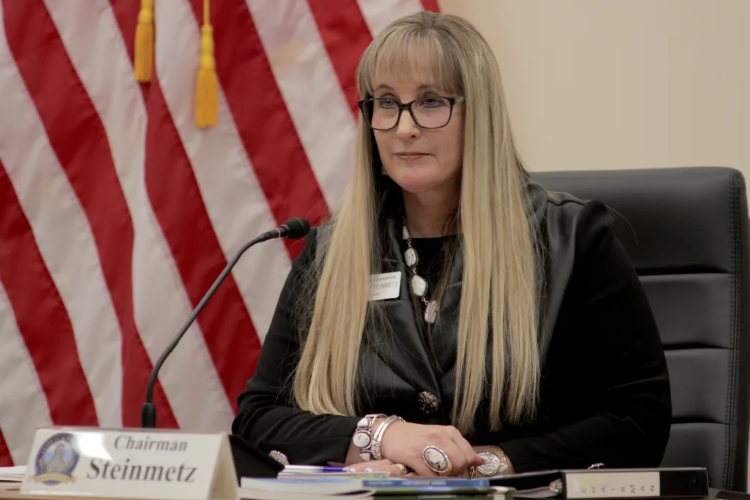Education Savings Accounts: School Choice Advocates Aim for Expanded Eligibility
Wyoming DOE launched an online hub for families who qualify for state funds for non-public school costs.

Get stories like this delivered straight to your inbox. Sign up for The 74 Newsletter
As the Wyoming Department of Education prepares to roll out a new education savings account program, school-choice advocates are again asking lawmakers to expand the non-public-school assistance program to more families.
That comes among warnings that expansion could jeopardize its already challenged constitutionality.
It’s the latest twist for a measure that was transformed, killed, revived, amended scores of times, passed by the Legislature, then partially vetoed by Gov. Mark Gordon in March before finally becoming law. The tug-of-war reflected the different outcomes advocates hoped the bill would achieve: early childhood education for some, universal access to non-public-school choice for others.
As it stands, the law creates a program to give income-qualified families state funds to offset private, pre-K tuition and homeschool education costs. Families who earn up to 150% of the federal poverty level — $48,800 for a family of four — can qualify for up to $6,000 to pay for school expenses for a child aged 4 up to 12th grade. Allowed uses include school supplies, tuition or tutors.
Gordon narrowed the income eligibility standards by removing families on the wealthier end of the spectrum when he vetoed parts of the bill before allowing it to pass into law. Gordon’s changes were motivated by constitutional concerns, he noted, pointing explicitly to the Wyoming Constitution’s prohibition on the state giving money to individuals “except for the necessary support of the poor.”
His vetoed version might not mark the end of the saga; school-choice advocates voiced interest during a Wednesday Joint Education Committee meeting in tweaking the bill again to broaden eligibility.
“Should we tweak this legislation in the next session?” Sen. Cheri Steinmetz (R-Lingle) asked. “Because we clearly had a different idea of what we were trying to do with this bill then maybe the governor’s veto reflects.”
A rocky path
The education savings account law has roots in a pair of bills introduced during the 2023 legislature session. They would have given families $6,000 per K-12 student for tuition at any non-governmental school or related educational expenses. Those measures failed, but a new proposal that would also extend the money to early childhood education costs emerged between the 2023 and 2024 sessions. Speaker of the House Albert Sommers (R-Pinedale), who helped block one of those 2023 bills, touted the legislation as a compromise for those clamoring for more early childhood funding and those who want to support parental choice for options like private school or homeschooling.

Questions of constitutionality have swirled around the measure since those interim discussions. Along with the “support of the poor” concern, critics have pushed back on the legitimacy of effectively transferring state funds to religious schools.
The measure traveled a rocky path through the session before arriving at Gordon’s desk. After passing the House relatively unscathed, Senate lawmakers stripped it of income qualifications and pre-K eligibility. The House declined to accept that version, sending the legislation into a negotiation process that resulted in the final iteration.
The version that landed on Gordon’s desk had a tiered income-qualification system based on the percentage of the federal income poverty level — $6,000 for families earning 150% or below; $4,800 for families earning 150%-200%; $3,600 for families earning 200%-250%; all the way down to $400 for families earning 450%-500%. For a family of four, 500% of the federal poverty level is an annual income of $156,000.
Gordon eliminated eligibility for all but families at or below 150%. “While the intent to support education and parent choice is commendable, my analysis revealed practical and constitutional complications within the bill’s provisions,” the governor wrote in a letter explaining his vetoes.
Building the program
Wyoming allocated $20 million to seed the account, along with nearly $1 million for contracting and administration costs. Two positions will be created to help administer the ESA program. In anticipation of the Jan. 1 program launch, the education department has established an online information hub to prepare the public for the application process.
“We know we’ve got to get a lot done prior to [Jan. 1],” Wyoming Department of Education Chief of Staff Dicky Shanor told the committee. A big task is staffing the positions: an educational expert to oversee the academic requirements of the program and a financial expert to manage the financial requirements. The department will also put out a request for proposals for a vendor to partner on setting up some kind of online marketplace, he said.
In addition, the department also needs to draft and finalize rules for administering the program, which will entail public comment, according to the education department. Those rules will dictate what kind of expenses are allowed, among other things.

Rep. Ken Clouston (R-Gillette), who co-sponsored the education savings account bill that became law, asked Shanor about state programs that give money to people who earn up to 250% of the federal poverty level. Steinmetz followed with her question about tweaking the act and if that would affect the Jan. 1 rollout.
Shanor didn’t know exactly how it would affect the timelines, “But I can say that Superintendent [of Public Instruction Megan] Degenfelder has supported the concept of this being as universally available as possible.”
Court test?
“One of the purposes of this bill is to have the opportunity for a court test and contest over what we really can do … in the K-12 system for private and other non-public schools,” Sen. Charles Scott (R-Casper) said to Tania Hytrek of the Legislative Service Office Wednesday. “Even with the veto, this bill provides the opportunity for that kind of a court test … does it not?”
Hytrek confirmed that. “To my knowledge a challenge to the bill has not been filed. But certainly the issues that were pointed out last year a number of times through LSO memos still exist even with the governor’s veto.”
Scott wondered if the program would have to get up and running before a court challenge would come. Hytrek said a court challenge could come either way, but noted that “it would take someone, an interested party, filing a challenge to the legislation which has not happened to date.”
The one individual to give public comment, former representative and current state director of Americans for Prosperity Tyler Lindholm, said his organization supports an effort to restore broader eligibility.
“I hope that you’ll move forward with legislation this year” and rework the process, Lindholm said. “I think the message that was sent by the Legislature with the passage of this legislation is that school choice and parents’ decisions matter. And I think the message sent from the governor’s office was somewhere along the lines of ‘you’re not necessarily poor enough.’ And that’s a rough message.”
Get stories like these delivered straight to your inbox. Sign up for The 74 Newsletter

;)